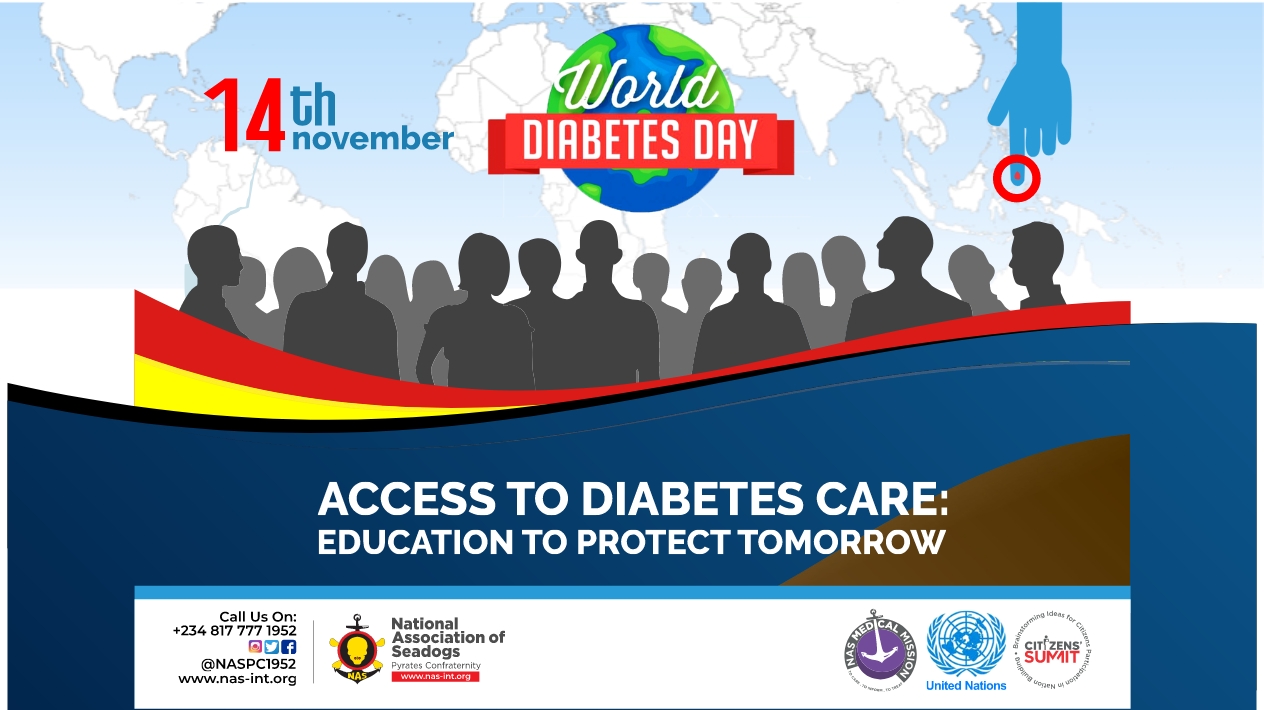Since 2007 when the General Assembly of the United Nations adopted resolution 61/225 which recognised the 14th of November of every year as World Diabetes Day, with a clarion call to “pursue multilateral efforts to promote and improve human health, and provide access to treatment and health-care education”, the disease has continued to take a disturbing toll on humanity.
The scary prospects of the disease for the future of mankind assume even more terrifying dimensions against the background of the fact that of the over 1 billion people affected globally, nearly 500 million people are totally unaware that they have the disease. Deaths from diabetes have increased by 20% since the year 2000, making it one of the top ten deadliest ailments in the world.
The theme of this year’s commemoration of World Diabetes Day – Access to Diabetes Education – places a very strong emphasis on raising awareness through global education in order to improve knowledge of the disease, preventive measures, necessary lifestyle changes, and overall management for improved outcomes. In selecting this theme for the 2021-2023 commemorations, the International Diabetes Federation recognised the worrisome dearth of access to care, and the urgent need to have a more knowledgeable global population in order to mitigate ever-rising morbidity and mortality statistics which currently have one in every ten adults suffering from Diabetes Mellitus.
The National Association of Seadogs (Pyrates Confraternity) joins the rest of the world in marking this year’s World Diabetes Day. We recognise the sombre reality which the worsening crisis imposes on humanity and the profound need for more concerted alliances in confronting the menace through provision of access and improved global knowledge of the disease. In line with our age-long ethos, we join all well-meaning advocacy organisations and nongovernmental institutions in raising the red flag, and pushing for lasting reforms that will reverse a trend that poses a dangerous threat across the globe.
The African continent and the rest of the developing nations bear the heaviest brunt of the scourge. Widespread poverty and illiteracy in these regions have widened the economic gap between social classes, and worsened the fate of people living with diabetes. Nigeria, in particular, has paid a heavy price in this regard with reports of an increasing prevalence of Type 2 Diabetes in an exponential manner. Over 10 million Nigerians (5.7% of adults) are suffering from Diabetes, and in the last 2 years, the disease has killed more Nigerians than COVID-19 and cancer combined. This number is predicted to be doubled by the year 2030. The Endocrinology and Metabolism Society of Nigeria has stated that diabetes is a major cause of blindness, kidney failure, heart attacks, stroke, amputation of lower limbs, etc. This untenable state of affairs is made even grimmer by the fact that Nigeria, with a population of over 218 million people, has only 150 qualified endocrinologists!
We are extremely worried by these alarming statistics, especially at a time when Nigeria is experiencing the greatest mass exodus of qualified doctors and other health personnel from its shores. An estimated 10,000 doctors have left Nigeria in the last 7 years, and the Nigerian Medical Association statistics released in October 2022 stated that 50 doctors leave Nigeria every week. Between August 31, 2022 and September 30, 2022, the UK’s General Medical Council revealed that it licensed at least 200 trained Nigerian doctors. This wave of unending emigration by our best brains in the health sector is attributable to sundry factors, chief of which are poor remuneration, rising insecurity, and failure of successive governments to place much-needed premium on the sector in terms of funding, training and working conditions.
As the world marks the World Diabetes Day, we call on the Federal Government, and governments at all levels in Nigeria to understand the gravity of the crisis in the health sector, and rouse from the disturbing slumber that has rendered the health sector comatose. Diabetes and other deadly ailments have been continually left unattended due to a dearth of medical personnel, and a concomitant cavalier attitude on full display by the government.
We urge the federal government to, through well thought out policy initiatives, reverse this ugly trend that has left the country with just about 24,000 actively licensed medical doctors caring for over 218 million people. The annual health budget must be increased to meet global requirements, and huge financial investments committed to the areas of remuneration and postgraduate education of medical professionals.
Beyond providing a veritable avenue for boosting awareness of diabetes as a global health menace, the World Diabetes Day is also a great opportunity for countries such as Nigeria to cast an emergency glance towards national health planning, policies and financing, in order to foster a healthier population. The Federal Government of Nigeria should give more effect to the implementation of the Sugar-Sweetened Beverage (SSB) tax as contained in the Finance Act of 2021; a ₦10 tax on each litre of all non-alcoholic and sugar-sweetened carbonated drinks aimed at reducing excessive consumption of sugars. Other fiscal policies targeted at improving the economic wellbeing of Nigerians must be urgently put in place in order to empower patients with the resources with which to afford their treatment. Anything short of these measures will definitely prove catastrophic.
Abiola Owoaje
NAS Capoon
Abuja.


![[PRESS RELEASE] AFFIRMATION OF EMERGENCY RULE IN RIVERS STATE THROUGH “AYES AND NAYS”](https://www.nas-int.org/wp-content/uploads/2025/03/National-Assembly-Ayes-and-Nays-400x250.jpeg)

